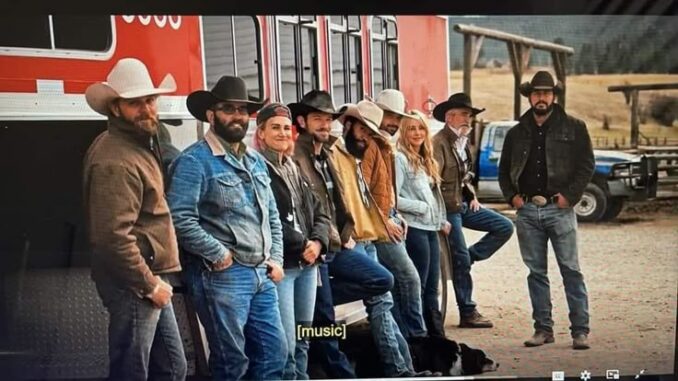
The Yellowstone Effect — More Than Just a Drama
Ever heard of a show that turns casual viewers into diehard fans overnight? That’s Yellowstone. Its explosive popularity is not just because of Kevin Costner or the epic Montana landscapes—it’s because it dares to ask real questions. Who owns the land? What price is too high for family loyalty? Where does power actually lie?
A Brief Overview of Yellowstone’s Premise
At its core, Yellowstone revolves around the Dutton family, owners of the largest ranch in the U.S. They’ll do anything—literally anything—to protect their land from greedy developers, political power plays, and even Native American tribes reclaiming ancestral territories.

John Dutton — A Cowboy or a King?
Kevin Costner’s John Dutton is no simple rancher. He’s a mix of old-school honor and ruthless strategy. Picture a cowboy in boots with the brain of a political tactician. His character embodies the old West, but he operates like a modern-day CEO.
Power, Politics, and Property Rights
Let’s talk about one of the show’s strongest themes—land ownership and political influence. Yellowstone pulls no punches when exposing the dirty deals behind real estate, local governance, and federal power struggles. This isn’t fantasy—it’s rooted in very real American issues.
Eminent Domain and Development Battles
The show dives into how governments and corporations manipulate land laws. From shady developers to local politicians, Yellowstone highlights how the Wild West has become a battleground for modern capitalism.
Indigenous Land and Generational Justice
One of the most powerful—and often overlooked—subplots involves Native American tribes fighting to reclaim stolen land. This isn’t just history repeating—it’s history refusing to be erased. The Broken Rock Reservation storyline adds emotional weight and political depth.
Meet the Characters That Make It All Work
You can’t talk about Yellowstone without diving into its iconic characters. Each one represents a piece of the puzzle in this complex war over land and legacy.
Beth Dutton — Chaos in High Heels
She’s fierce, foul-mouthed, and probably the most badass character on TV right now. Beth Dutton plays the game of power with fire and finesse, and her character perfectly bridges the gap between family loyalty and corporate warfare.
Rip Wheeler — Loyalty with a Dark Edge
Rip is John’s right-hand man. He’s what you’d get if Clint Eastwood and a sledgehammer had a baby. Fiercely loyal, terrifyingly brutal, and surprisingly emotional, Rip is the muscle and the heart.
Kayce Dutton — The Soldier Torn Between Two Worlds
A war vet trying to balance his Native American heritage and his Dutton bloodline. He’s constantly torn between peace and violence—kind of like the modern West itself.

Yellowstone as a Political Allegory
This show is like a mirror—reflecting back the uncomfortable truths of American politics. It’s not red or blue. It’s raw, real, and ruthless.
Government Corruption and Corporate Greed
From slimy developers to backdoor deals, Yellowstone shows how politics isn’t about right or wrong—it’s about who holds the reins.
The Rural vs. Urban Divide
The show masterfully captures the tension between big-city developers and rural ranchers. It’s the age-old fight of tradition vs. progress, with no clear hero in sight.
The Modern Western — Why Yellowstone Feels So Different
Traditional Westerns painted cowboys as heroes and everyone else as the bad guy. But Yellowstone flips that script. It’s morally gray, gritty, and incredibly nuanced.
Yellowstone’s Visuals — Cinematic Storytelling at Its Best
Shot on location in Montana and Utah, every frame of Yellowstone feels like a postcard. The sweeping vistas aren’t just eye candy—they reflect the vastness of the battles being fought.
The Impact of Yellowstone on TV Culture
Since Yellowstone exploded, we’ve seen a wave of similar dramas—1883, 1923, and even other non-Westerns trying to capture that rugged realism. It’s changed what audiences expect from TV.
What Makes Yellowstone Addictive?
Is it the plot twists? The power plays? The endless drama? Probably all of the above. Yellowstone is like a shot of whiskey—smooth, strong, and it burns a little going down.

Is Yellowstone Conservative or Progressive?
Here’s the kicker—it’s both. It appeals to traditional values like family and land, but it also tackles social issues like gentrification, race, and environmentalism. It’s a political Rorschach test, and that’s what makes it so compelling.
Yellowstone’s Legacy — What Comes Next?
With spin-offs and new seasons already in the works, Yellowstone isn’t just a show—it’s a universe. The story’s just getting started, and it shows no signs of slowing down.
Conclusion — Why Yellowstone is the Western We Didn’t Know We Needed
So, what makes Yellowstone so powerful? It’s real. It’s raw. It’s relevant. It takes the dusty themes of the Old West and slams them headfirst into today’s chaotic political landscape. It’s not just about cattle and cowboy hats—it’s about who survives when power, land, and legacy collide.
